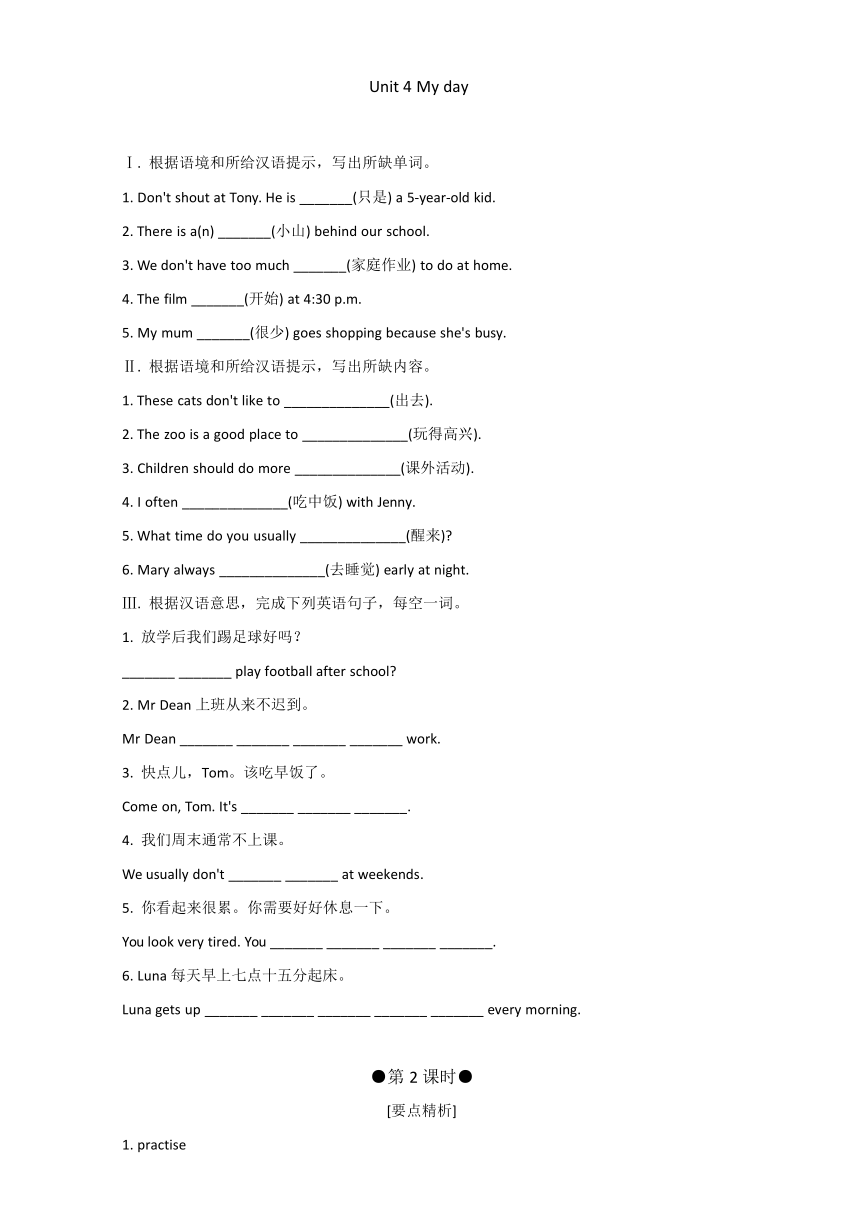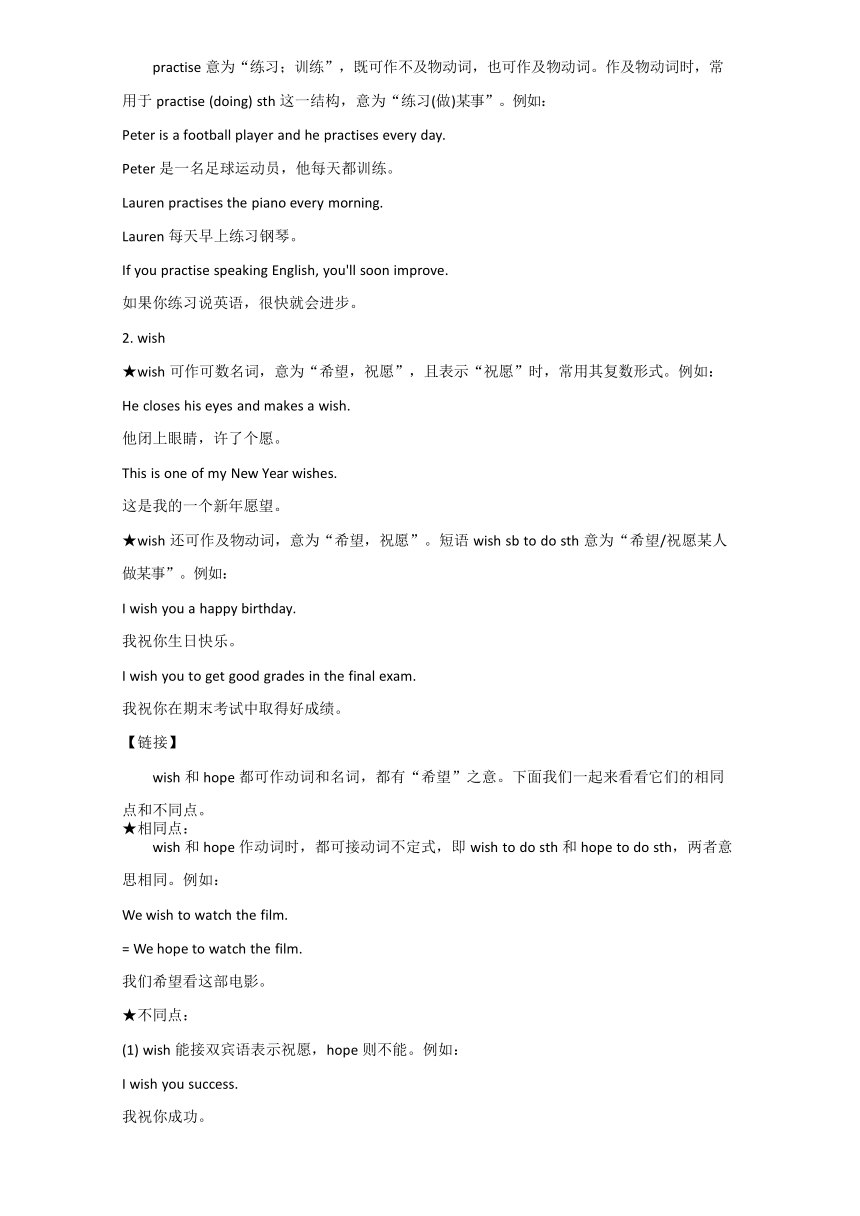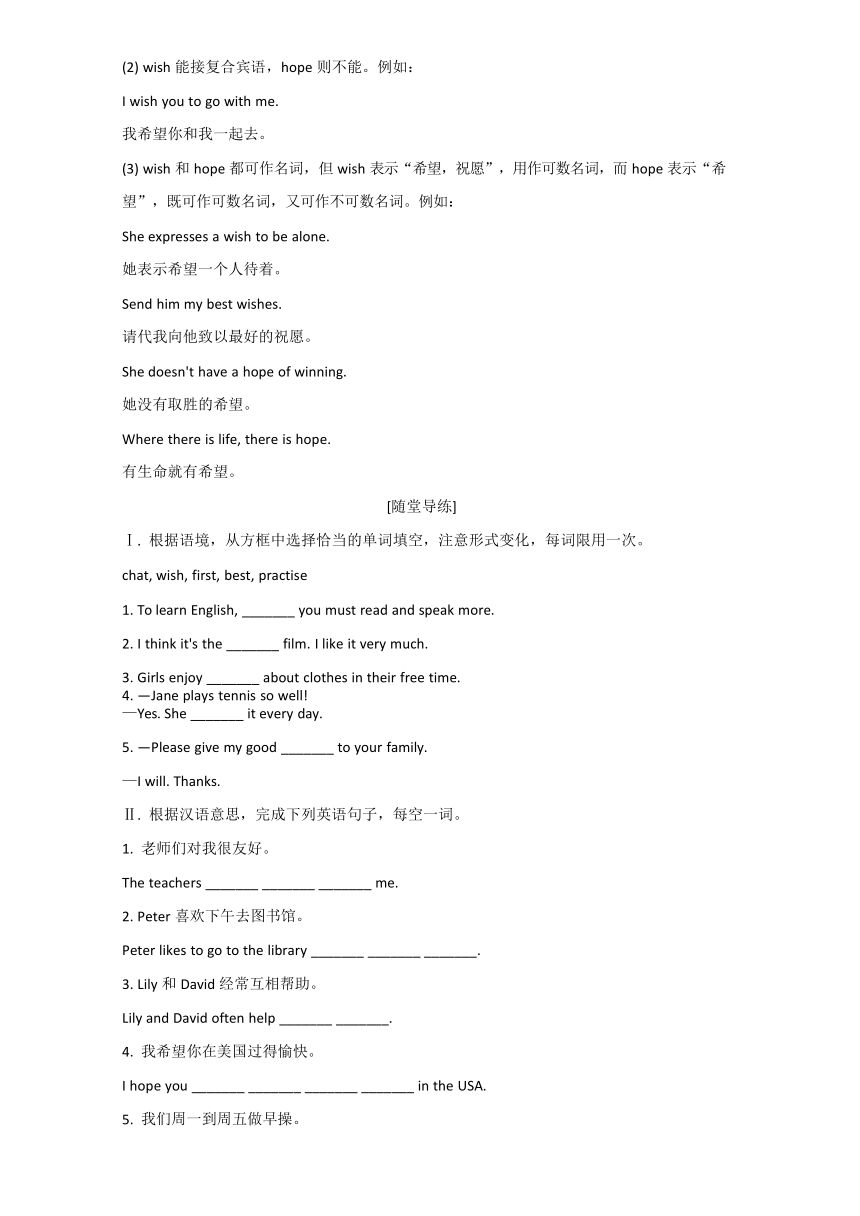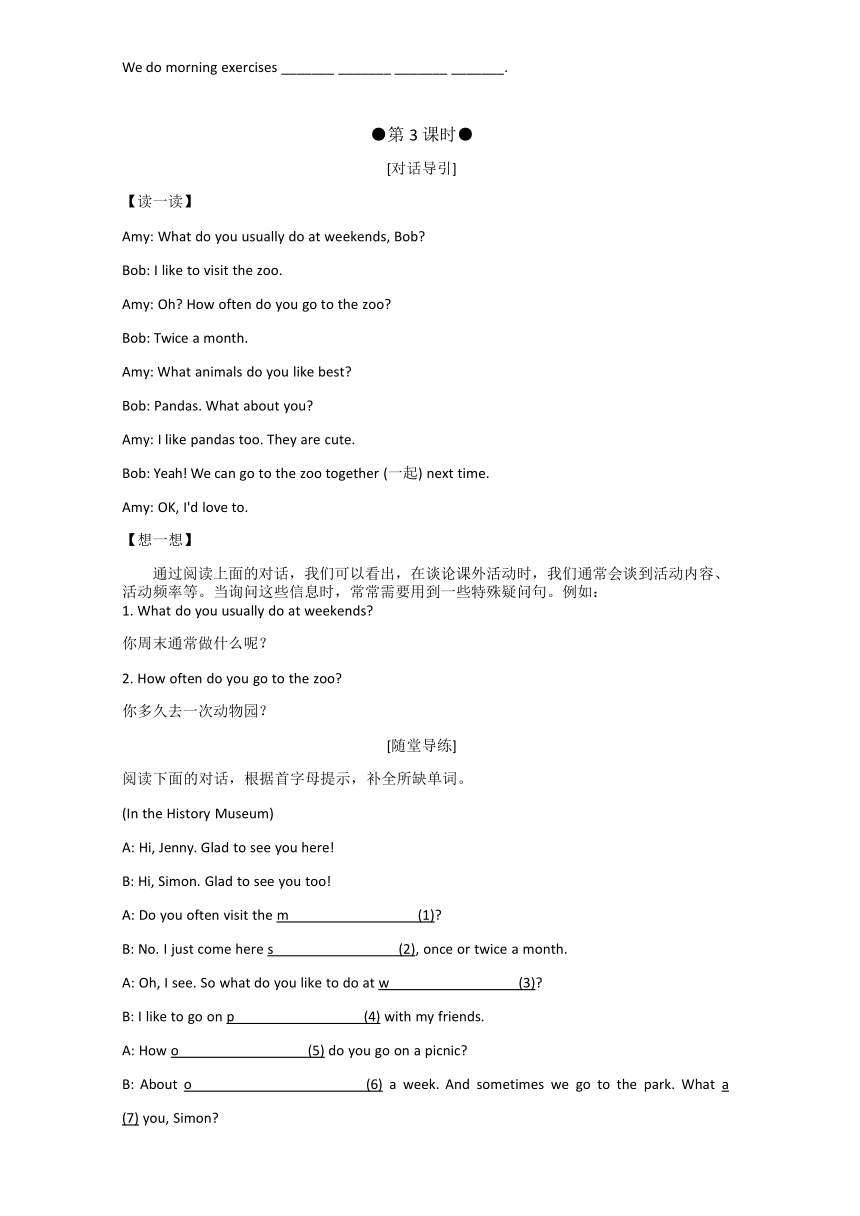Unit 4 My day 单元练习 2023-2024学年牛津译林版七年级英语上册(含答案)
文档属性
| 名称 | Unit 4 My day 单元练习 2023-2024学年牛津译林版七年级英语上册(含答案) |  | |
| 格式 | docx | ||
| 文件大小 | 2.8MB | ||
| 资源类型 | 教案 | ||
| 版本资源 | 牛津译林版 | ||
| 科目 | 英语 | ||
| 更新时间 | 2023-09-14 09:54:13 | ||
图片预览




文档简介
Unit 4 My day
Ⅰ. 根据语境和所给汉语提示,写出所缺单词。
1. Don't shout at Tony. He is _______(只是) a 5-year-old kid.
2. There is a(n) _______(小山) behind our school.
3. We don't have too much _______(家庭作业) to do at home.
4. The film _______(开始) at 4:30 p.m.
5. My mum _______(很少) goes shopping because she's busy.
Ⅱ. 根据语境和所给汉语提示,写出所缺内容。
1. These cats don't like to ______________(出去).
2. The zoo is a good place to ______________(玩得高兴).
3. Children should do more ______________(课外活动).
4. I often ______________(吃中饭) with Jenny.
5. What time do you usually ______________(醒来)
6. Mary always ______________(去睡觉) early at night.
Ⅲ. 根据汉语意思,完成下列英语句子,每空一词。
1. 放学后我们踢足球好吗?
_______ _______ play football after school
2. Mr Dean 上班从来不迟到。
Mr Dean _______ _______ _______ _______ work.
3. 快点儿,Tom。该吃早饭了。
Come on, Tom. It's _______ _______ _______.
4. 我们周末通常不上课。
We usually don't _______ _______ at weekends.
5. 你看起来很累。你需要好好休息一下。
You look very tired. You _______ _______ _______ _______.
6. Luna 每天早上七点十五分起床。
Luna gets up _______ _______ _______ _______ _______ every morning.
●第 2 课时●
[要点精析]
1. practise
practise 意为“练习;训练”,既可作不及物动词,也可作及物动词。作及物动词时,常
用于 practise (doing) sth 这一结构,意为“练习(做)某事”。例如:
Peter is a football player and he practises every day.
Peter 是一名足球运动员,他每天都训练。
Lauren practises the piano every morning.
Lauren 每天早上练习钢琴。
If you practise speaking English, you'll soon improve.
如果你练习说英语,很快就会进步。
2. wish
★wish 可作可数名词,意为“希望,祝愿”,且表示“祝愿”时,常用其复数形式。例如:
He closes his eyes and makes a wish.
他闭上眼睛,许了个愿。
This is one of my New Year wishes.
这是我的一个新年愿望。
★wish 还可作及物动词,意为“希望,祝愿”。短语 wish sb to do sth 意为“希望/祝愿某人
做某事”。例如:
I wish you a happy birthday.
我祝你生日快乐。
I wish you to get good grades in the final exam.
我祝你在期末考试中取得好成绩。
【链接】
wish 和 hope 都可作动词和名词,都有“希望”之意。下面我们一起来看看它们的相同
点和不同点。
★相同点:
wish 和 hope 作动词时,都可接动词不定式,即 wish to do sth 和 hope to do sth,两者意
思相同。例如:
We wish to watch the film.
= We hope to watch the film.
我们希望看这部电影。
★不同点:
(1) wish 能接双宾语表示祝愿,hope 则不能。例如:
I wish you success.
我祝你成功。
(2) wish 能接复合宾语,hope 则不能。例如:
I wish you to go with me.
我希望你和我一起去。
(3) wish 和 hope 都可作名词,但 wish 表示“希望,祝愿”,用作可数名词,而 hope 表示“希
望”,既可作可数名词,又可作不可数名词。例如:
She expresses a wish to be alone.
她表示希望一个人待着。
Send him my best wishes.
请代我向他致以最好的祝愿。
She doesn't have a hope of winning.
她没有取胜的希望。
Where there is life, there is hope.
有生命就有希望。
[随堂导练]
Ⅰ. 根据语境,从方框中选择恰当的单词填空,注意形式变化,每词限用一次。
chat, wish, first, best, practise
1. To learn English, _______ you must read and speak more.
2. I think it's the _______ film. I like it very much.
3. Girls enjoy _______ about clothes in their free time.
4. —Jane plays tennis so well!
—Yes. She _______ it every day.
5. —Please give my good _______ to your family.
—I will. Thanks.
Ⅱ. 根据汉语意思,完成下列英语句子,每空一词。
1. 老师们对我很友好。
The teachers _______ _______ _______ me.
2. Peter 喜欢下午去图书馆。
Peter likes to go to the library _______ _______ _______.
3. Lily 和 David 经常互相帮助。
Lily and David often help _______ _______.
4. 我希望你在美国过得愉快。
I hope you _______ _______ _______ _______ in the USA.
5. 我们周一到周五做早操。
We do morning exercises _______ _______ _______ _______.
●第 3 课时●
[对话导引]
【读一读】
Amy: What do you usually do at weekends, Bob
Bob: I like to visit the zoo.
Amy: Oh How often do you go to the zoo
Bob: Twice a month.
Amy: What animals do you like best
Bob: Pandas. What about you
Amy: I like pandas too. They are cute.
Bob: Yeah! We can go to the zoo together (一起) next time.
Amy: OK, I'd love to.
【想一想】
通过阅读上面的对话,我们可以看出,在谈论课外活动时,我们通常会谈到活动内容、
活动频率等。当询问这些信息时,常常需要用到一些特殊疑问句。例如:
1. What do you usually do at weekends
你周末通常做什么呢?
2. How often do you go to the zoo
你多久去一次动物园?
[随堂导练]
阅读下面的对话,根据首字母提示,补全所缺单词。
(In the History Museum)
A: Hi, Jenny. Glad to see you here!
B: Hi, Simon. Glad to see you too!
A: Do you often visit the m (1)
B: No. I just come here s (2), once or twice a month.
A: Oh, I see. So what do you like to do at w (3)
B: I like to go on p (4) with my friends.
A: How o (5) do you go on a picnic
B: About o (6) a week. And sometimes we go to the park. What a
(7) you, Simon
A: I like playing b (8) with my friends. And there is a basketball game this
Sunday in our club.
B: Oh, really I w (9) like to watch it. And w (10) you
good luck!
A: That's great! Thank you.
●第 4 课时●
[拼读导拨]
元音 (Ⅲ)
我们已经了解了五个元音字母在单词中的发音规则。现在,一起来学习一下与这五个元
音字母相关的字母组合的读音规则吧。
★表一
字母组合 读音 单词示例
ar /ɑ / far, start
al / / tall, walk
ee /i / tree, street
ou / / would, could
er / / dinner, sister
【点拨】
通过观察每组单词下划线字母组合的读音,我们可以看出:字母组合 ar、al、ee、ou、
er 在单词中分别可发/ɑ /、/ /、/i /、/ /、/ /的音。
★表二
字母组合 读音 单词示例
/i / meat, clean ea
/e/ head, sweater
/u / cool, moon oo
/ / good, cook
ir first, girl
/ /
ur nurse, turn
/ / word, work or
/ / forty, short
【点拨】
通过观察每组单词下划线字母组合的读音,我们可以看出:字母组合 ea 在单词中可发
/i /或/e/的音;字母组合 oo 在单词中可发/u / 或/ /的音;字母组合 ir 和 ur 在单词中可发/ / 的
音;字母组合 or 在单词中可发/ /或/ /的音。
[随堂导练]
选出下列各组单词中划线部分与其他三个发音不同的选项。
( )1.
A. girl C. nurse
B. dirty D. picture
( )2.
A. bread B. head
C. early D. weather
( )3.
A. doctor C. short
B. horse D. morning
( )4.
A. book C. cook
B. about D. could
( )5.
A. also C. half
B. talk D. always
参考答案:
第 1 课时
随堂导练
Ⅰ. 1. just / only 2. hill 3. homework
4. starts / begins 5. seldom
Ⅱ. 1. go out 2. have fun 3. after-school activities
4. have / eat lunch 5. wake up
6. goes to bed / sleep
Ⅲ. 1. Shall we 2. is never late for
3. time for breakfast 4. have lessons / classes
5. need a good rest 6. at a quarter past seven
第 2 课时
随堂导练
Ⅰ. 1. first 2. best 3. chatting 4. practises
5. wishes
Ⅱ. 1. are nice to 2. in the afternoon 3. each other
4. have a good time 5. from Monday to Friday
第 3 课时
随堂导练
1. museum 2. sometimes 3. weekends 4. picnics
5. often 6. once 7. about 8. basketball 9. would
10. wish
第 4 课时
随堂导练
1—5 DCABC
Ⅰ. 根据语境和所给汉语提示,写出所缺单词。
1. Don't shout at Tony. He is _______(只是) a 5-year-old kid.
2. There is a(n) _______(小山) behind our school.
3. We don't have too much _______(家庭作业) to do at home.
4. The film _______(开始) at 4:30 p.m.
5. My mum _______(很少) goes shopping because she's busy.
Ⅱ. 根据语境和所给汉语提示,写出所缺内容。
1. These cats don't like to ______________(出去).
2. The zoo is a good place to ______________(玩得高兴).
3. Children should do more ______________(课外活动).
4. I often ______________(吃中饭) with Jenny.
5. What time do you usually ______________(醒来)
6. Mary always ______________(去睡觉) early at night.
Ⅲ. 根据汉语意思,完成下列英语句子,每空一词。
1. 放学后我们踢足球好吗?
_______ _______ play football after school
2. Mr Dean 上班从来不迟到。
Mr Dean _______ _______ _______ _______ work.
3. 快点儿,Tom。该吃早饭了。
Come on, Tom. It's _______ _______ _______.
4. 我们周末通常不上课。
We usually don't _______ _______ at weekends.
5. 你看起来很累。你需要好好休息一下。
You look very tired. You _______ _______ _______ _______.
6. Luna 每天早上七点十五分起床。
Luna gets up _______ _______ _______ _______ _______ every morning.
●第 2 课时●
[要点精析]
1. practise
practise 意为“练习;训练”,既可作不及物动词,也可作及物动词。作及物动词时,常
用于 practise (doing) sth 这一结构,意为“练习(做)某事”。例如:
Peter is a football player and he practises every day.
Peter 是一名足球运动员,他每天都训练。
Lauren practises the piano every morning.
Lauren 每天早上练习钢琴。
If you practise speaking English, you'll soon improve.
如果你练习说英语,很快就会进步。
2. wish
★wish 可作可数名词,意为“希望,祝愿”,且表示“祝愿”时,常用其复数形式。例如:
He closes his eyes and makes a wish.
他闭上眼睛,许了个愿。
This is one of my New Year wishes.
这是我的一个新年愿望。
★wish 还可作及物动词,意为“希望,祝愿”。短语 wish sb to do sth 意为“希望/祝愿某人
做某事”。例如:
I wish you a happy birthday.
我祝你生日快乐。
I wish you to get good grades in the final exam.
我祝你在期末考试中取得好成绩。
【链接】
wish 和 hope 都可作动词和名词,都有“希望”之意。下面我们一起来看看它们的相同
点和不同点。
★相同点:
wish 和 hope 作动词时,都可接动词不定式,即 wish to do sth 和 hope to do sth,两者意
思相同。例如:
We wish to watch the film.
= We hope to watch the film.
我们希望看这部电影。
★不同点:
(1) wish 能接双宾语表示祝愿,hope 则不能。例如:
I wish you success.
我祝你成功。
(2) wish 能接复合宾语,hope 则不能。例如:
I wish you to go with me.
我希望你和我一起去。
(3) wish 和 hope 都可作名词,但 wish 表示“希望,祝愿”,用作可数名词,而 hope 表示“希
望”,既可作可数名词,又可作不可数名词。例如:
She expresses a wish to be alone.
她表示希望一个人待着。
Send him my best wishes.
请代我向他致以最好的祝愿。
She doesn't have a hope of winning.
她没有取胜的希望。
Where there is life, there is hope.
有生命就有希望。
[随堂导练]
Ⅰ. 根据语境,从方框中选择恰当的单词填空,注意形式变化,每词限用一次。
chat, wish, first, best, practise
1. To learn English, _______ you must read and speak more.
2. I think it's the _______ film. I like it very much.
3. Girls enjoy _______ about clothes in their free time.
4. —Jane plays tennis so well!
—Yes. She _______ it every day.
5. —Please give my good _______ to your family.
—I will. Thanks.
Ⅱ. 根据汉语意思,完成下列英语句子,每空一词。
1. 老师们对我很友好。
The teachers _______ _______ _______ me.
2. Peter 喜欢下午去图书馆。
Peter likes to go to the library _______ _______ _______.
3. Lily 和 David 经常互相帮助。
Lily and David often help _______ _______.
4. 我希望你在美国过得愉快。
I hope you _______ _______ _______ _______ in the USA.
5. 我们周一到周五做早操。
We do morning exercises _______ _______ _______ _______.
●第 3 课时●
[对话导引]
【读一读】
Amy: What do you usually do at weekends, Bob
Bob: I like to visit the zoo.
Amy: Oh How often do you go to the zoo
Bob: Twice a month.
Amy: What animals do you like best
Bob: Pandas. What about you
Amy: I like pandas too. They are cute.
Bob: Yeah! We can go to the zoo together (一起) next time.
Amy: OK, I'd love to.
【想一想】
通过阅读上面的对话,我们可以看出,在谈论课外活动时,我们通常会谈到活动内容、
活动频率等。当询问这些信息时,常常需要用到一些特殊疑问句。例如:
1. What do you usually do at weekends
你周末通常做什么呢?
2. How often do you go to the zoo
你多久去一次动物园?
[随堂导练]
阅读下面的对话,根据首字母提示,补全所缺单词。
(In the History Museum)
A: Hi, Jenny. Glad to see you here!
B: Hi, Simon. Glad to see you too!
A: Do you often visit the m (1)
B: No. I just come here s (2), once or twice a month.
A: Oh, I see. So what do you like to do at w (3)
B: I like to go on p (4) with my friends.
A: How o (5) do you go on a picnic
B: About o (6) a week. And sometimes we go to the park. What a
(7) you, Simon
A: I like playing b (8) with my friends. And there is a basketball game this
Sunday in our club.
B: Oh, really I w (9) like to watch it. And w (10) you
good luck!
A: That's great! Thank you.
●第 4 课时●
[拼读导拨]
元音 (Ⅲ)
我们已经了解了五个元音字母在单词中的发音规则。现在,一起来学习一下与这五个元
音字母相关的字母组合的读音规则吧。
★表一
字母组合 读音 单词示例
ar /ɑ / far, start
al / / tall, walk
ee /i / tree, street
ou / / would, could
er / / dinner, sister
【点拨】
通过观察每组单词下划线字母组合的读音,我们可以看出:字母组合 ar、al、ee、ou、
er 在单词中分别可发/ɑ /、/ /、/i /、/ /、/ /的音。
★表二
字母组合 读音 单词示例
/i / meat, clean ea
/e/ head, sweater
/u / cool, moon oo
/ / good, cook
ir first, girl
/ /
ur nurse, turn
/ / word, work or
/ / forty, short
【点拨】
通过观察每组单词下划线字母组合的读音,我们可以看出:字母组合 ea 在单词中可发
/i /或/e/的音;字母组合 oo 在单词中可发/u / 或/ /的音;字母组合 ir 和 ur 在单词中可发/ / 的
音;字母组合 or 在单词中可发/ /或/ /的音。
[随堂导练]
选出下列各组单词中划线部分与其他三个发音不同的选项。
( )1.
A. girl C. nurse
B. dirty D. picture
( )2.
A. bread B. head
C. early D. weather
( )3.
A. doctor C. short
B. horse D. morning
( )4.
A. book C. cook
B. about D. could
( )5.
A. also C. half
B. talk D. always
参考答案:
第 1 课时
随堂导练
Ⅰ. 1. just / only 2. hill 3. homework
4. starts / begins 5. seldom
Ⅱ. 1. go out 2. have fun 3. after-school activities
4. have / eat lunch 5. wake up
6. goes to bed / sleep
Ⅲ. 1. Shall we 2. is never late for
3. time for breakfast 4. have lessons / classes
5. need a good rest 6. at a quarter past seven
第 2 课时
随堂导练
Ⅰ. 1. first 2. best 3. chatting 4. practises
5. wishes
Ⅱ. 1. are nice to 2. in the afternoon 3. each other
4. have a good time 5. from Monday to Friday
第 3 课时
随堂导练
1. museum 2. sometimes 3. weekends 4. picnics
5. often 6. once 7. about 8. basketball 9. would
10. wish
第 4 课时
随堂导练
1—5 DCABC
同课章节目录
- 预备课程
- Lesson 1 Nice to meet you !
- Lesson 2 A happy family
- Lesson 3 A nice school
- Lesson 4 You look cool !
- Lesson 5 Wonderful things
- Lesson 6 Have nice food
- Lesson 7 Enjoy our days
- Lesson 8 Let's have fun !
- Unit 1 This is me
- Unit 2 Let's play sports
- Unit 3 Welcome to our school
- Unit 4 My day
- Unit 5 Let’s celebrate
- Unit 6 Food and lifestyle
- Unit 7 Shopping
- Unit 8 Fashion
